Investigating CSR, Competitiveness at John Lewis Partnership
VerifiedAdded on 2023/06/17
|12
|1797
|374
Project
AI Summary
This research project investigates the significance of Corporate Social Responsibility (CSR) practices within international businesses, focusing on the John Lewis Partnership. It examines the relationship between CSR practices and organizational competitiveness, identifies major challenges in implementing CSR, and analyzes a CSR report to identify key stakeholder management approaches. The research employs a qualitative approach, utilizing secondary data and thematic analysis to explore these aspects. The study addresses research questions related to CSR theories, frameworks, and the impact of CSR on competitiveness, ultimately aiming to provide recommendations for enhancing CSR practices at John Lewis Partnership.
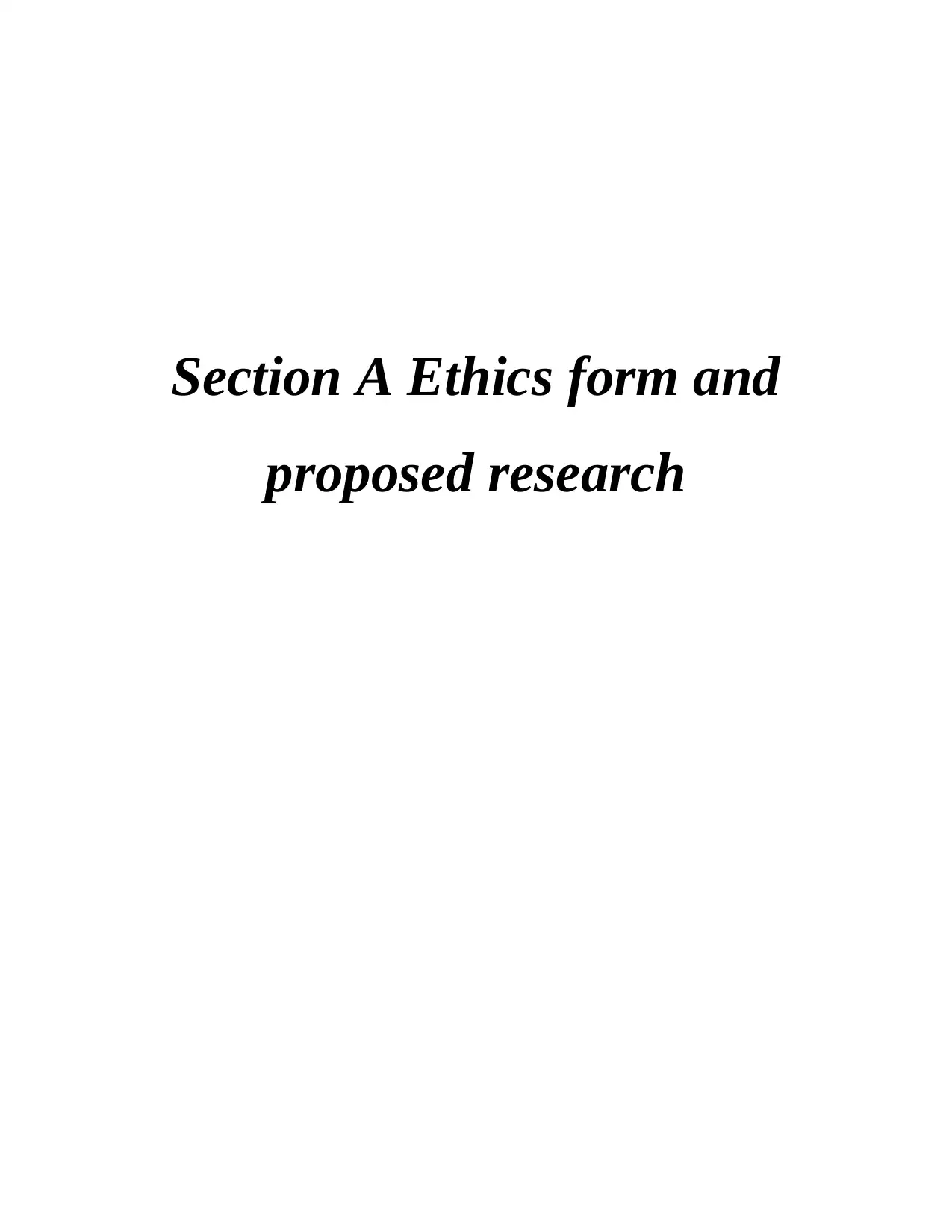
Section A Ethics form and
proposed research
proposed research
Paraphrase This Document
Need a fresh take? Get an instant paraphrase of this document with our AI Paraphraser
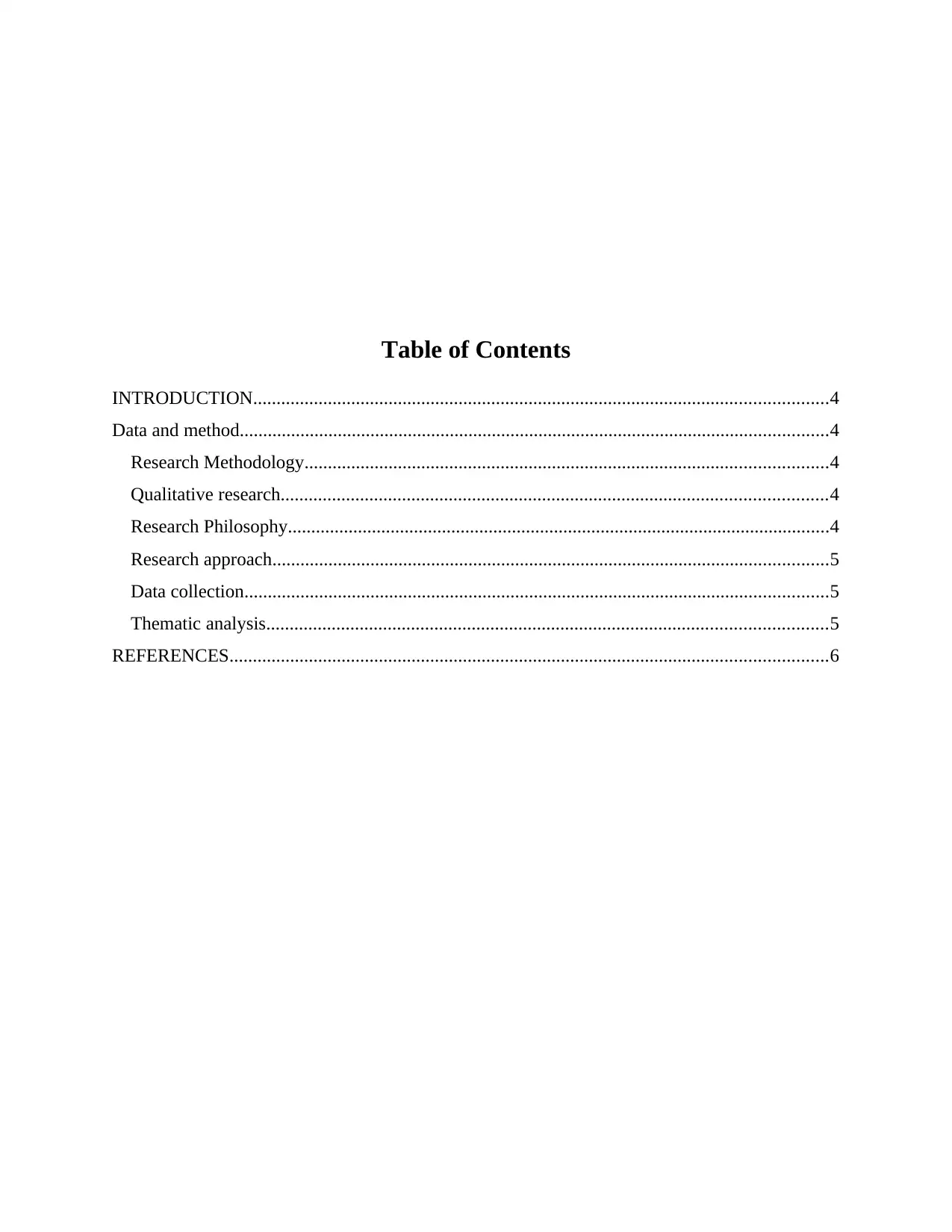
Table of Contents
INTRODUCTION...........................................................................................................................4
Data and method..............................................................................................................................4
Research Methodology................................................................................................................4
Qualitative research.....................................................................................................................4
Research Philosophy....................................................................................................................4
Research approach.......................................................................................................................5
Data collection.............................................................................................................................5
Thematic analysis........................................................................................................................5
REFERENCES................................................................................................................................6
INTRODUCTION...........................................................................................................................4
Data and method..............................................................................................................................4
Research Methodology................................................................................................................4
Qualitative research.....................................................................................................................4
Research Philosophy....................................................................................................................4
Research approach.......................................................................................................................5
Data collection.............................................................................................................................5
Thematic analysis........................................................................................................................5
REFERENCES................................................................................................................................6
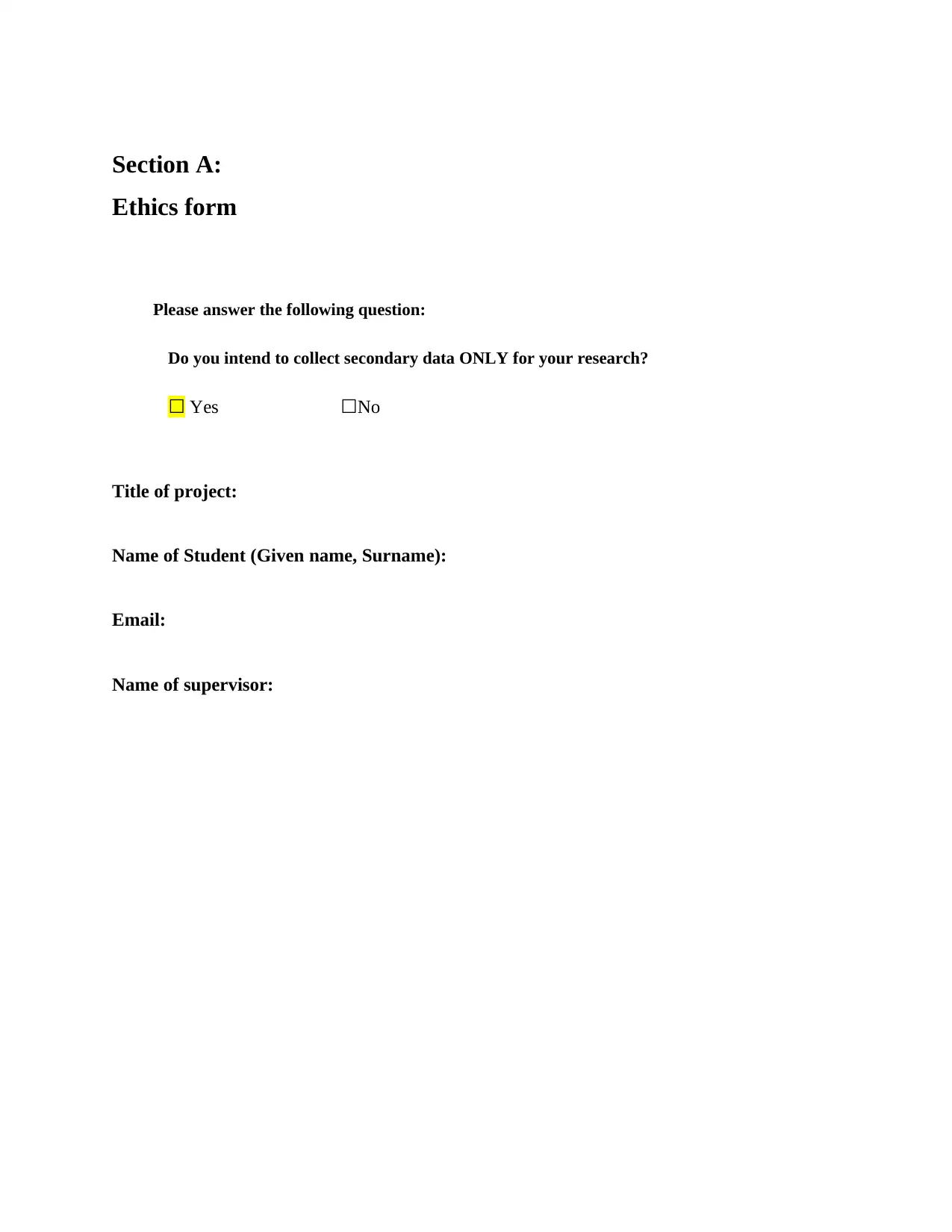
Section A:
Ethics form
Please answer the following question:
Do you intend to collect secondary data ONLY for your research?
☐ Yes ☐No
Title of project:
Name of Student (Given name, Surname):
Email:
Name of supervisor:
Ethics form
Please answer the following question:
Do you intend to collect secondary data ONLY for your research?
☐ Yes ☐No
Title of project:
Name of Student (Given name, Surname):
Email:
Name of supervisor:
⊘ This is a preview!⊘
Do you want full access?
Subscribe today to unlock all pages.

Trusted by 1+ million students worldwide
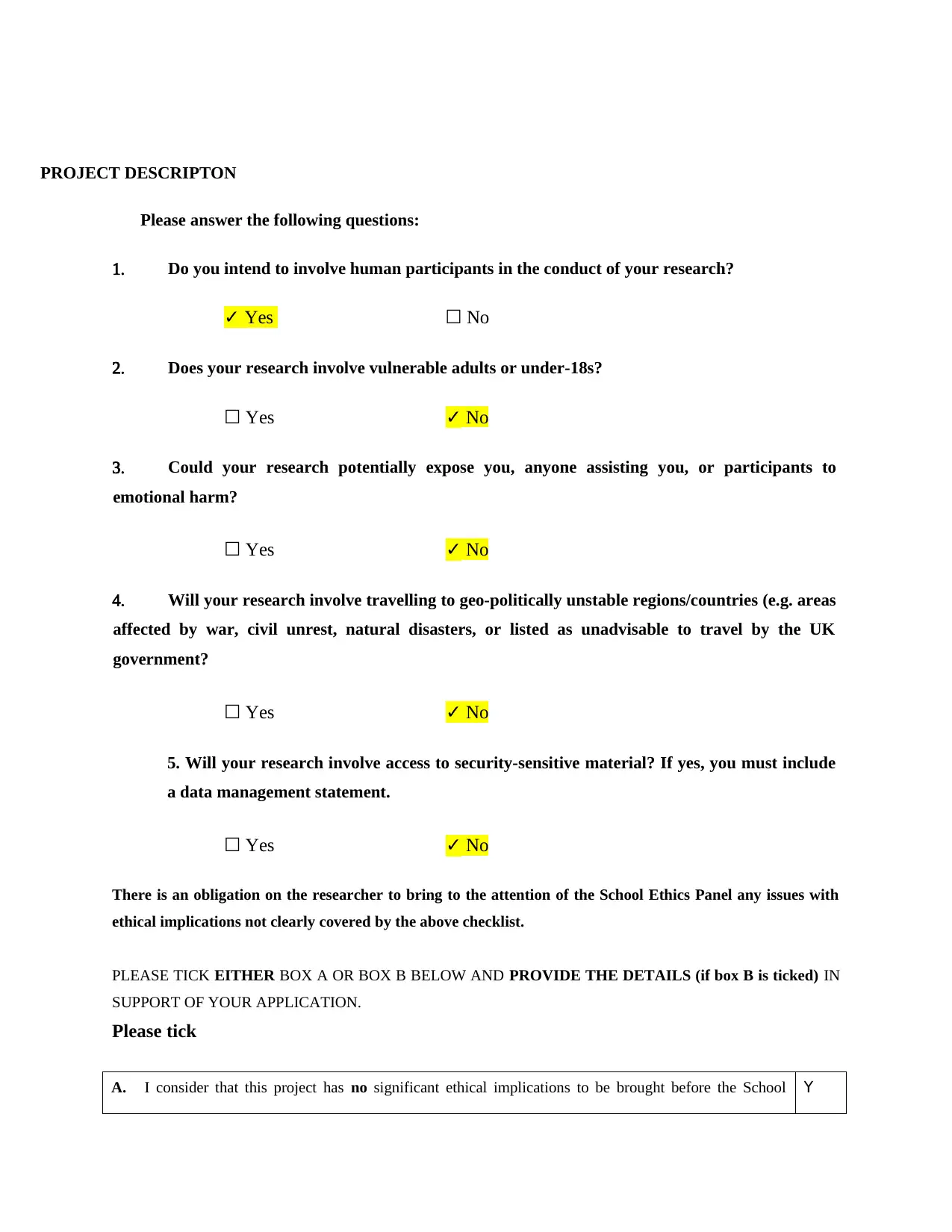
PROJECT DESCRIPTON
Please answer the following questions:
1. Do you intend to involve human participants in the conduct of your research?
✓ Yes ☐ No
2. Does your research involve vulnerable adults or under-18s?
☐ Yes ✓ No
3. Could your research potentially expose you, anyone assisting you, or participants to
emotional harm?
☐ Yes ✓ No
4. Will your research involve travelling to geo-politically unstable regions/countries (e.g. areas
affected by war, civil unrest, natural disasters, or listed as unadvisable to travel by the UK
government?
☐ Yes ✓ No
5. Will your research involve access to security-sensitive material? If yes, you must include
a data management statement.
☐ Yes ✓ No
There is an obligation on the researcher to bring to the attention of the School Ethics Panel any issues with
ethical implications not clearly covered by the above checklist.
PLEASE TICK EITHER BOX A OR BOX B BELOW AND PROVIDE THE DETAILS (if box B is ticked) IN
SUPPORT OF YOUR APPLICATION.
Please tick
A. I consider that this project has no significant ethical implications to be brought before the School Y
Please answer the following questions:
1. Do you intend to involve human participants in the conduct of your research?
✓ Yes ☐ No
2. Does your research involve vulnerable adults or under-18s?
☐ Yes ✓ No
3. Could your research potentially expose you, anyone assisting you, or participants to
emotional harm?
☐ Yes ✓ No
4. Will your research involve travelling to geo-politically unstable regions/countries (e.g. areas
affected by war, civil unrest, natural disasters, or listed as unadvisable to travel by the UK
government?
☐ Yes ✓ No
5. Will your research involve access to security-sensitive material? If yes, you must include
a data management statement.
☐ Yes ✓ No
There is an obligation on the researcher to bring to the attention of the School Ethics Panel any issues with
ethical implications not clearly covered by the above checklist.
PLEASE TICK EITHER BOX A OR BOX B BELOW AND PROVIDE THE DETAILS (if box B is ticked) IN
SUPPORT OF YOUR APPLICATION.
Please tick
A. I consider that this project has no significant ethical implications to be brought before the School Y
Paraphrase This Document
Need a fresh take? Get an instant paraphrase of this document with our AI Paraphraser

Ethics Panel.
B. I consider that this project may have ethical implications that should be brought before the School
Ethics Panel, and/or it will be carried out with children or other vulnerable populations.
N
I have discussed with my supervisor on any potential ethical issues relevant to my research
project as part of my preparation for this module.
Signed ___________________________ Print Name ______________________
Date _______________
(Student)
Signed ___________________________ Print Name ______________________
Date _______________
(Supervisor)
B. I consider that this project may have ethical implications that should be brought before the School
Ethics Panel, and/or it will be carried out with children or other vulnerable populations.
N
I have discussed with my supervisor on any potential ethical issues relevant to my research
project as part of my preparation for this module.
Signed ___________________________ Print Name ______________________
Date _______________
(Student)
Signed ___________________________ Print Name ______________________
Date _______________
(Supervisor)
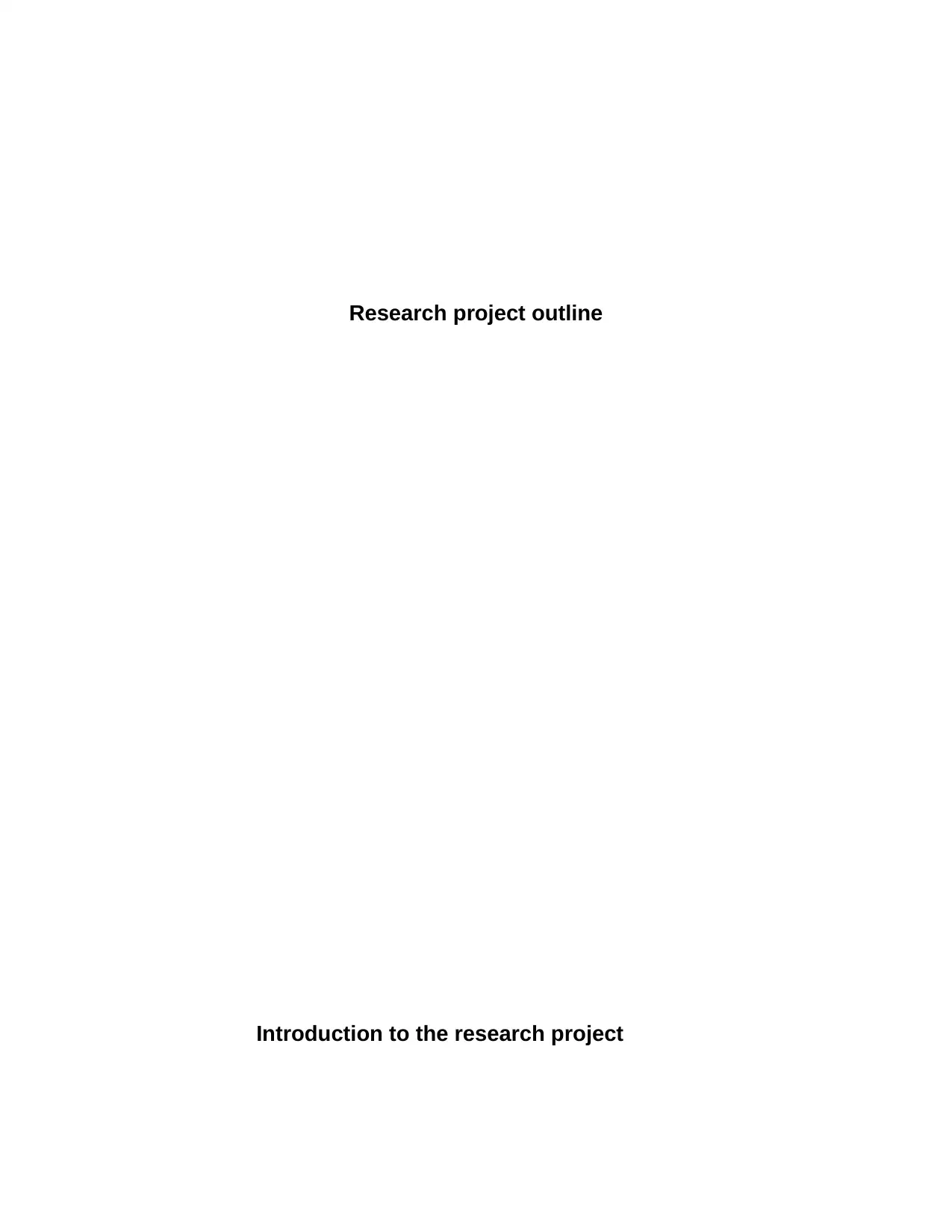
Research project outline
Introduction to the research project
Introduction to the research project
⊘ This is a preview!⊘
Do you want full access?
Subscribe today to unlock all pages.

Trusted by 1+ million students worldwide
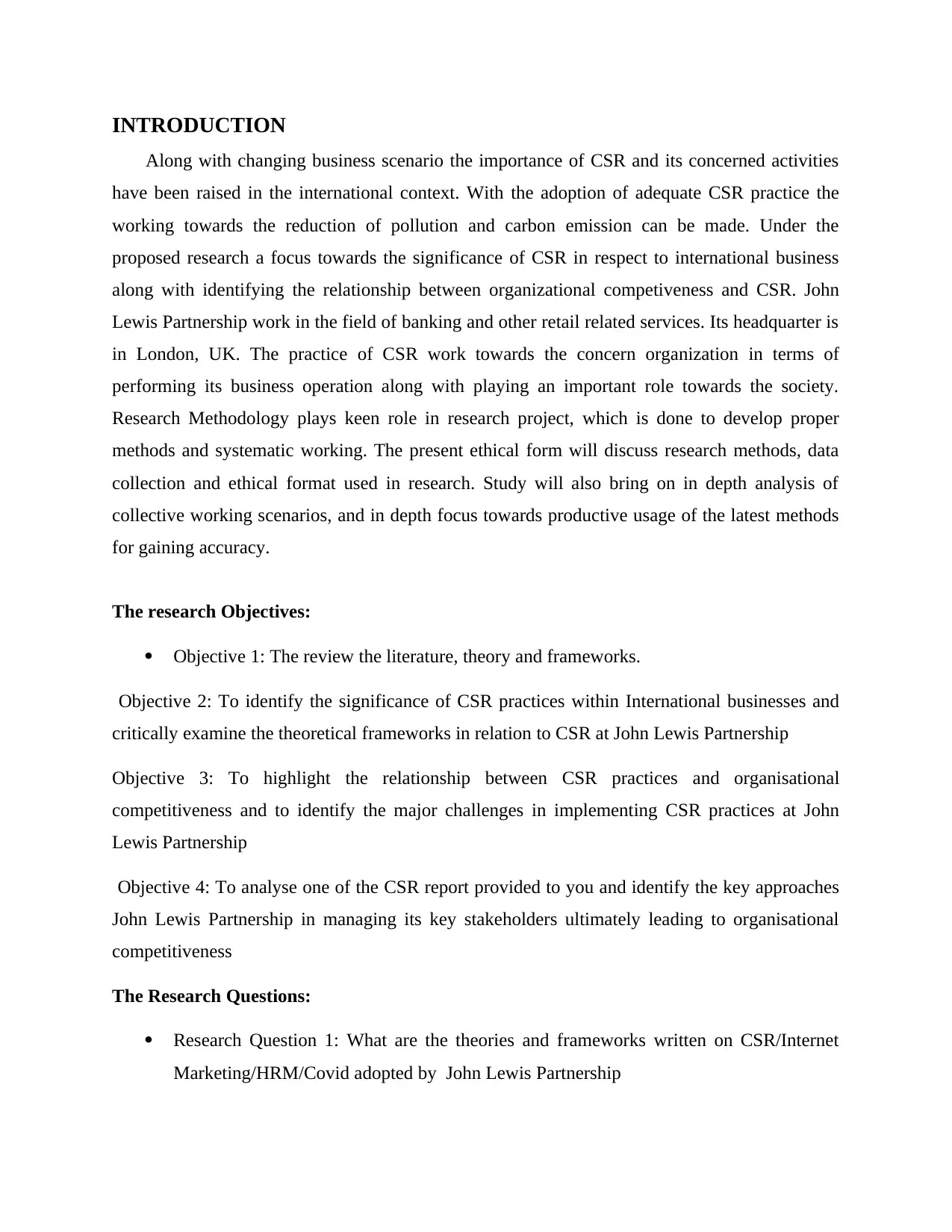
INTRODUCTION
Along with changing business scenario the importance of CSR and its concerned activities
have been raised in the international context. With the adoption of adequate CSR practice the
working towards the reduction of pollution and carbon emission can be made. Under the
proposed research a focus towards the significance of CSR in respect to international business
along with identifying the relationship between organizational competiveness and CSR. John
Lewis Partnership work in the field of banking and other retail related services. Its headquarter is
in London, UK. The practice of CSR work towards the concern organization in terms of
performing its business operation along with playing an important role towards the society.
Research Methodology plays keen role in research project, which is done to develop proper
methods and systematic working. The present ethical form will discuss research methods, data
collection and ethical format used in research. Study will also bring on in depth analysis of
collective working scenarios, and in depth focus towards productive usage of the latest methods
for gaining accuracy.
The research Objectives:
Objective 1: The review the literature, theory and frameworks.
Objective 2: To identify the significance of CSR practices within International businesses and
critically examine the theoretical frameworks in relation to CSR at John Lewis Partnership
Objective 3: To highlight the relationship between CSR practices and organisational
competitiveness and to identify the major challenges in implementing CSR practices at John
Lewis Partnership
Objective 4: To analyse one of the CSR report provided to you and identify the key approaches
John Lewis Partnership in managing its key stakeholders ultimately leading to organisational
competitiveness
The Research Questions:
Research Question 1: What are the theories and frameworks written on CSR/Internet
Marketing/HRM/Covid adopted by John Lewis Partnership
Along with changing business scenario the importance of CSR and its concerned activities
have been raised in the international context. With the adoption of adequate CSR practice the
working towards the reduction of pollution and carbon emission can be made. Under the
proposed research a focus towards the significance of CSR in respect to international business
along with identifying the relationship between organizational competiveness and CSR. John
Lewis Partnership work in the field of banking and other retail related services. Its headquarter is
in London, UK. The practice of CSR work towards the concern organization in terms of
performing its business operation along with playing an important role towards the society.
Research Methodology plays keen role in research project, which is done to develop proper
methods and systematic working. The present ethical form will discuss research methods, data
collection and ethical format used in research. Study will also bring on in depth analysis of
collective working scenarios, and in depth focus towards productive usage of the latest methods
for gaining accuracy.
The research Objectives:
Objective 1: The review the literature, theory and frameworks.
Objective 2: To identify the significance of CSR practices within International businesses and
critically examine the theoretical frameworks in relation to CSR at John Lewis Partnership
Objective 3: To highlight the relationship between CSR practices and organisational
competitiveness and to identify the major challenges in implementing CSR practices at John
Lewis Partnership
Objective 4: To analyse one of the CSR report provided to you and identify the key approaches
John Lewis Partnership in managing its key stakeholders ultimately leading to organisational
competitiveness
The Research Questions:
Research Question 1: What are the theories and frameworks written on CSR/Internet
Marketing/HRM/Covid adopted by John Lewis Partnership
Paraphrase This Document
Need a fresh take? Get an instant paraphrase of this document with our AI Paraphraser
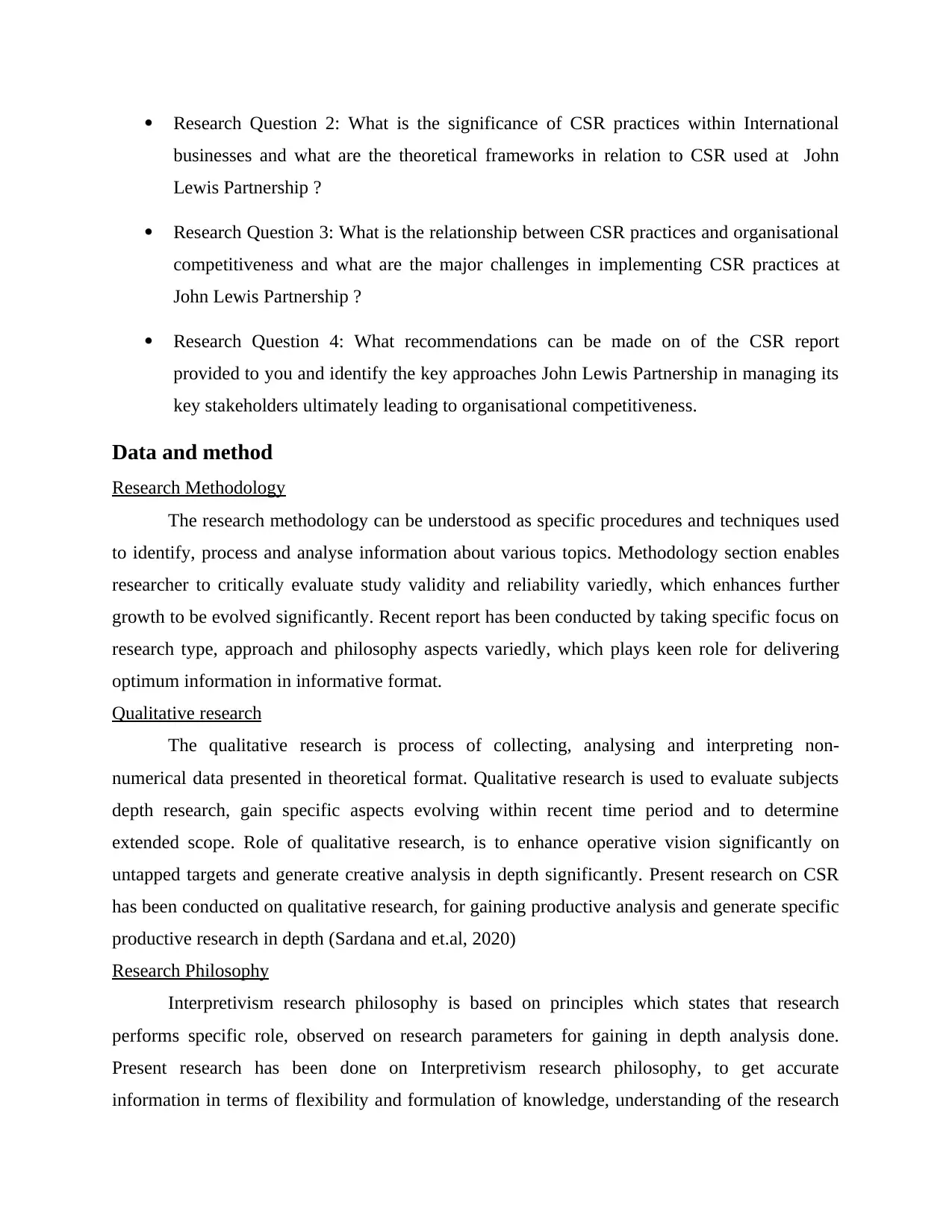
Research Question 2: What is the significance of CSR practices within International
businesses and what are the theoretical frameworks in relation to CSR used at John
Lewis Partnership ?
Research Question 3: What is the relationship between CSR practices and organisational
competitiveness and what are the major challenges in implementing CSR practices at
John Lewis Partnership ?
Research Question 4: What recommendations can be made on of the CSR report
provided to you and identify the key approaches John Lewis Partnership in managing its
key stakeholders ultimately leading to organisational competitiveness.
Data and method
Research Methodology
The research methodology can be understood as specific procedures and techniques used
to identify, process and analyse information about various topics. Methodology section enables
researcher to critically evaluate study validity and reliability variedly, which enhances further
growth to be evolved significantly. Recent report has been conducted by taking specific focus on
research type, approach and philosophy aspects variedly, which plays keen role for delivering
optimum information in informative format.
Qualitative research
The qualitative research is process of collecting, analysing and interpreting non-
numerical data presented in theoretical format. Qualitative research is used to evaluate subjects
depth research, gain specific aspects evolving within recent time period and to determine
extended scope. Role of qualitative research, is to enhance operative vision significantly on
untapped targets and generate creative analysis in depth significantly. Present research on CSR
has been conducted on qualitative research, for gaining productive analysis and generate specific
productive research in depth (Sardana and et.al, 2020)
Research Philosophy
Interpretivism research philosophy is based on principles which states that research
performs specific role, observed on research parameters for gaining in depth analysis done.
Present research has been done on Interpretivism research philosophy, to get accurate
information in terms of flexibility and formulation of knowledge, understanding of the research
businesses and what are the theoretical frameworks in relation to CSR used at John
Lewis Partnership ?
Research Question 3: What is the relationship between CSR practices and organisational
competitiveness and what are the major challenges in implementing CSR practices at
John Lewis Partnership ?
Research Question 4: What recommendations can be made on of the CSR report
provided to you and identify the key approaches John Lewis Partnership in managing its
key stakeholders ultimately leading to organisational competitiveness.
Data and method
Research Methodology
The research methodology can be understood as specific procedures and techniques used
to identify, process and analyse information about various topics. Methodology section enables
researcher to critically evaluate study validity and reliability variedly, which enhances further
growth to be evolved significantly. Recent report has been conducted by taking specific focus on
research type, approach and philosophy aspects variedly, which plays keen role for delivering
optimum information in informative format.
Qualitative research
The qualitative research is process of collecting, analysing and interpreting non-
numerical data presented in theoretical format. Qualitative research is used to evaluate subjects
depth research, gain specific aspects evolving within recent time period and to determine
extended scope. Role of qualitative research, is to enhance operative vision significantly on
untapped targets and generate creative analysis in depth significantly. Present research on CSR
has been conducted on qualitative research, for gaining productive analysis and generate specific
productive research in depth (Sardana and et.al, 2020)
Research Philosophy
Interpretivism research philosophy is based on principles which states that research
performs specific role, observed on research parameters for gaining in depth analysis done.
Present research has been done on Interpretivism research philosophy, to get accurate
information in terms of flexibility and formulation of knowledge, understanding of the research
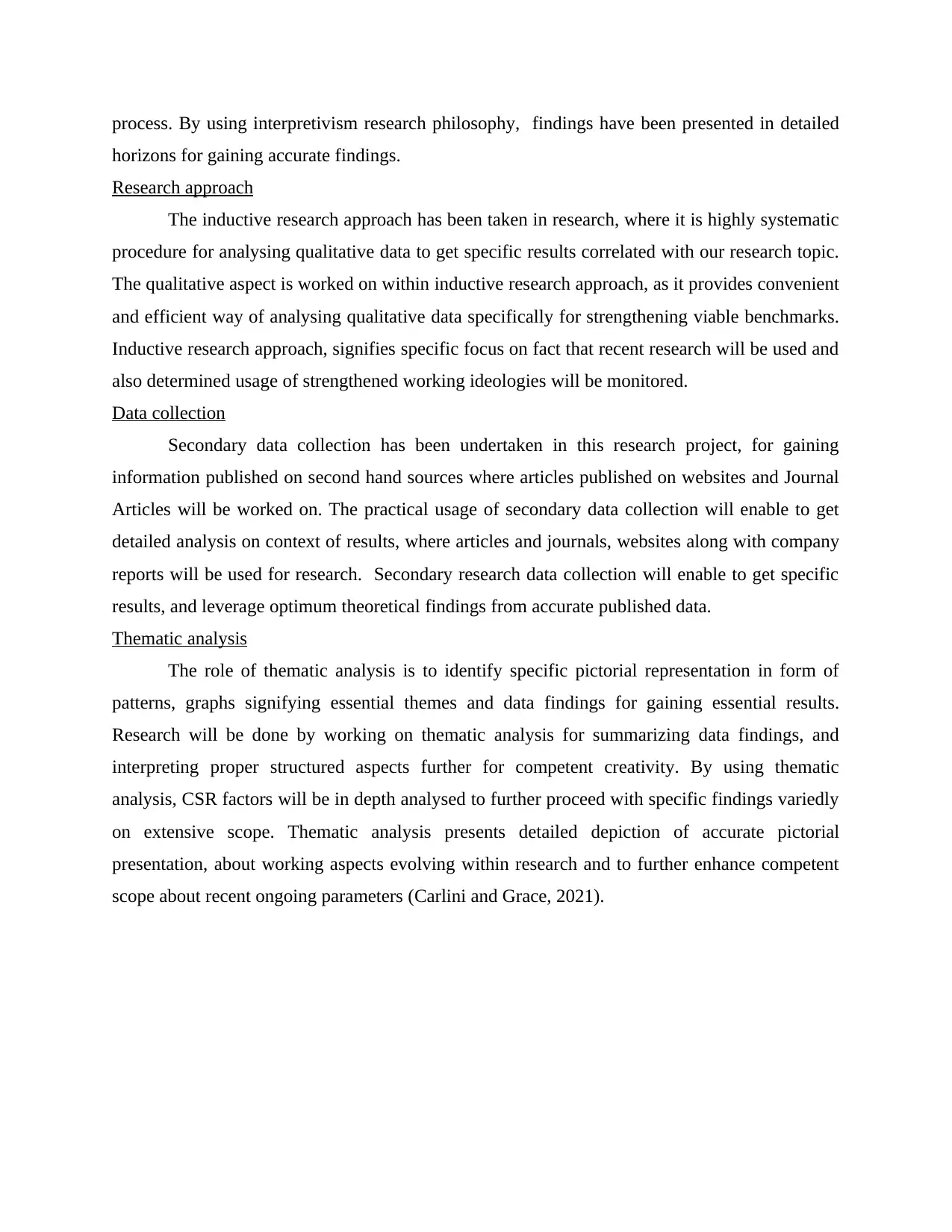
process. By using interpretivism research philosophy, findings have been presented in detailed
horizons for gaining accurate findings.
Research approach
The inductive research approach has been taken in research, where it is highly systematic
procedure for analysing qualitative data to get specific results correlated with our research topic.
The qualitative aspect is worked on within inductive research approach, as it provides convenient
and efficient way of analysing qualitative data specifically for strengthening viable benchmarks.
Inductive research approach, signifies specific focus on fact that recent research will be used and
also determined usage of strengthened working ideologies will be monitored.
Data collection
Secondary data collection has been undertaken in this research project, for gaining
information published on second hand sources where articles published on websites and Journal
Articles will be worked on. The practical usage of secondary data collection will enable to get
detailed analysis on context of results, where articles and journals, websites along with company
reports will be used for research. Secondary research data collection will enable to get specific
results, and leverage optimum theoretical findings from accurate published data.
Thematic analysis
The role of thematic analysis is to identify specific pictorial representation in form of
patterns, graphs signifying essential themes and data findings for gaining essential results.
Research will be done by working on thematic analysis for summarizing data findings, and
interpreting proper structured aspects further for competent creativity. By using thematic
analysis, CSR factors will be in depth analysed to further proceed with specific findings variedly
on extensive scope. Thematic analysis presents detailed depiction of accurate pictorial
presentation, about working aspects evolving within research and to further enhance competent
scope about recent ongoing parameters (Carlini and Grace, 2021).
horizons for gaining accurate findings.
Research approach
The inductive research approach has been taken in research, where it is highly systematic
procedure for analysing qualitative data to get specific results correlated with our research topic.
The qualitative aspect is worked on within inductive research approach, as it provides convenient
and efficient way of analysing qualitative data specifically for strengthening viable benchmarks.
Inductive research approach, signifies specific focus on fact that recent research will be used and
also determined usage of strengthened working ideologies will be monitored.
Data collection
Secondary data collection has been undertaken in this research project, for gaining
information published on second hand sources where articles published on websites and Journal
Articles will be worked on. The practical usage of secondary data collection will enable to get
detailed analysis on context of results, where articles and journals, websites along with company
reports will be used for research. Secondary research data collection will enable to get specific
results, and leverage optimum theoretical findings from accurate published data.
Thematic analysis
The role of thematic analysis is to identify specific pictorial representation in form of
patterns, graphs signifying essential themes and data findings for gaining essential results.
Research will be done by working on thematic analysis for summarizing data findings, and
interpreting proper structured aspects further for competent creativity. By using thematic
analysis, CSR factors will be in depth analysed to further proceed with specific findings variedly
on extensive scope. Thematic analysis presents detailed depiction of accurate pictorial
presentation, about working aspects evolving within research and to further enhance competent
scope about recent ongoing parameters (Carlini and Grace, 2021).
⊘ This is a preview!⊘
Do you want full access?
Subscribe today to unlock all pages.

Trusted by 1+ million students worldwide
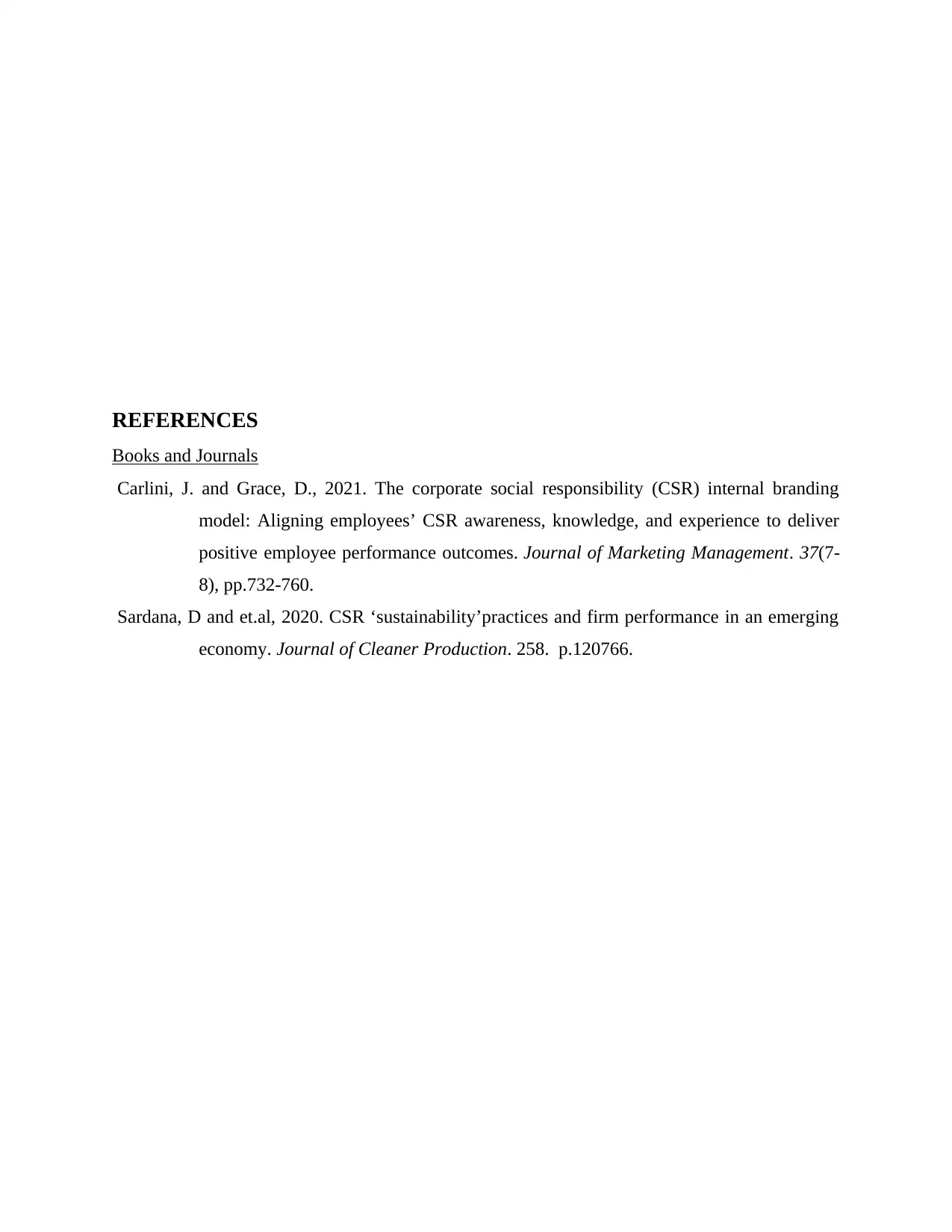
REFERENCES
Books and Journals
Carlini, J. and Grace, D., 2021. The corporate social responsibility (CSR) internal branding
model: Aligning employees’ CSR awareness, knowledge, and experience to deliver
positive employee performance outcomes. Journal of Marketing Management. 37(7-
8), pp.732-760.
Sardana, D and et.al, 2020. CSR ‘sustainability’practices and firm performance in an emerging
economy. Journal of Cleaner Production. 258. p.120766.
Books and Journals
Carlini, J. and Grace, D., 2021. The corporate social responsibility (CSR) internal branding
model: Aligning employees’ CSR awareness, knowledge, and experience to deliver
positive employee performance outcomes. Journal of Marketing Management. 37(7-
8), pp.732-760.
Sardana, D and et.al, 2020. CSR ‘sustainability’practices and firm performance in an emerging
economy. Journal of Cleaner Production. 258. p.120766.
Paraphrase This Document
Need a fresh take? Get an instant paraphrase of this document with our AI Paraphraser
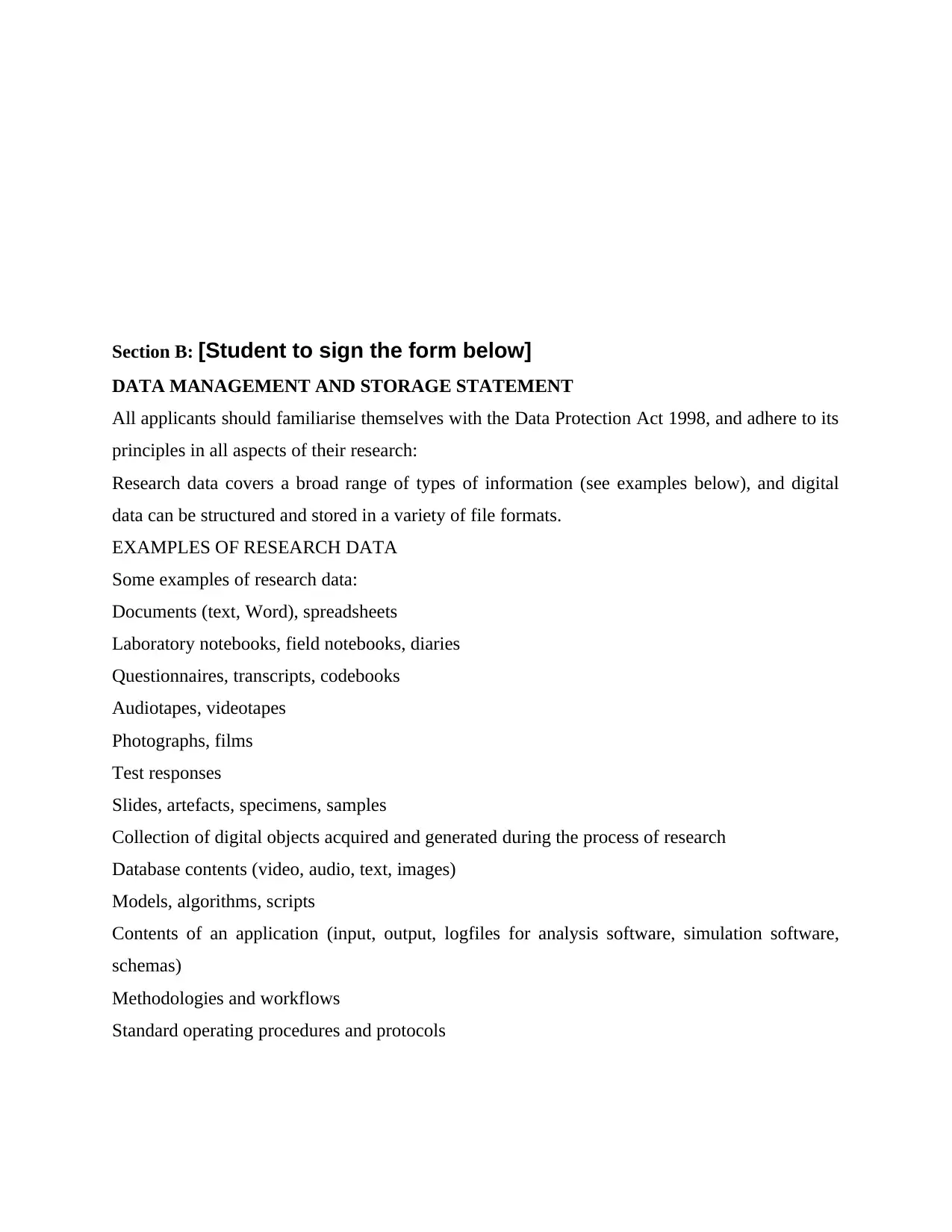
Section B: [Student to sign the form below]
DATA MANAGEMENT AND STORAGE STATEMENT
All applicants should familiarise themselves with the Data Protection Act 1998, and adhere to its
principles in all aspects of their research:
Research data covers a broad range of types of information (see examples below), and digital
data can be structured and stored in a variety of file formats.
EXAMPLES OF RESEARCH DATA
Some examples of research data:
Documents (text, Word), spreadsheets
Laboratory notebooks, field notebooks, diaries
Questionnaires, transcripts, codebooks
Audiotapes, videotapes
Photographs, films
Test responses
Slides, artefacts, specimens, samples
Collection of digital objects acquired and generated during the process of research
Database contents (video, audio, text, images)
Models, algorithms, scripts
Contents of an application (input, output, logfiles for analysis software, simulation software,
schemas)
Methodologies and workflows
Standard operating procedures and protocols
DATA MANAGEMENT AND STORAGE STATEMENT
All applicants should familiarise themselves with the Data Protection Act 1998, and adhere to its
principles in all aspects of their research:
Research data covers a broad range of types of information (see examples below), and digital
data can be structured and stored in a variety of file formats.
EXAMPLES OF RESEARCH DATA
Some examples of research data:
Documents (text, Word), spreadsheets
Laboratory notebooks, field notebooks, diaries
Questionnaires, transcripts, codebooks
Audiotapes, videotapes
Photographs, films
Test responses
Slides, artefacts, specimens, samples
Collection of digital objects acquired and generated during the process of research
Database contents (video, audio, text, images)
Models, algorithms, scripts
Contents of an application (input, output, logfiles for analysis software, simulation software,
schemas)
Methodologies and workflows
Standard operating procedures and protocols
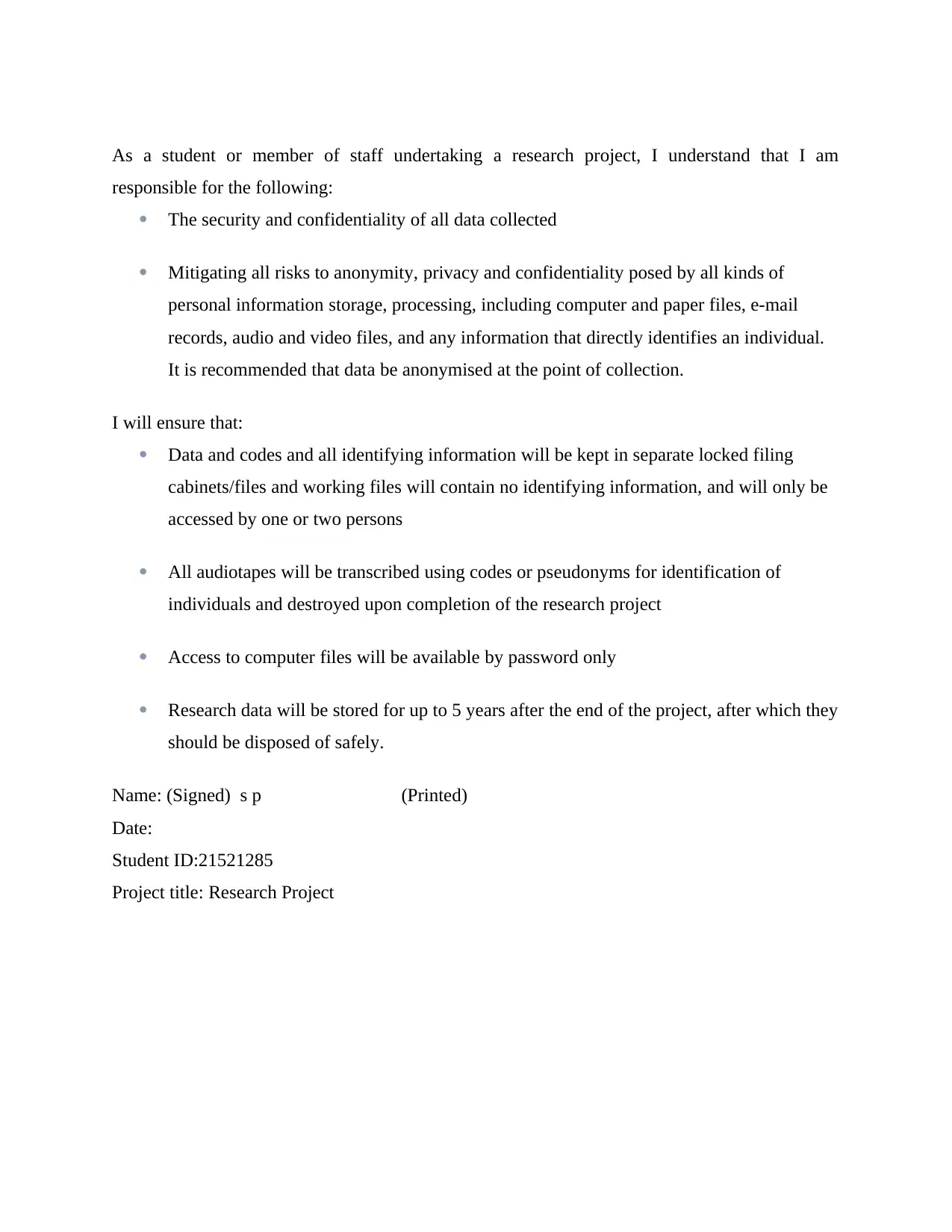
As a student or member of staff undertaking a research project, I understand that I am
responsible for the following:
The security and confidentiality of all data collected
Mitigating all risks to anonymity, privacy and confidentiality posed by all kinds of
personal information storage, processing, including computer and paper files, e-mail
records, audio and video files, and any information that directly identifies an individual.
It is recommended that data be anonymised at the point of collection.
I will ensure that:
Data and codes and all identifying information will be kept in separate locked filing
cabinets/files and working files will contain no identifying information, and will only be
accessed by one or two persons
All audiotapes will be transcribed using codes or pseudonyms for identification of
individuals and destroyed upon completion of the research project
Access to computer files will be available by password only
Research data will be stored for up to 5 years after the end of the project, after which they
should be disposed of safely.
Name: (Signed) s p (Printed)
Date:
Student ID:21521285
Project title: Research Project
responsible for the following:
The security and confidentiality of all data collected
Mitigating all risks to anonymity, privacy and confidentiality posed by all kinds of
personal information storage, processing, including computer and paper files, e-mail
records, audio and video files, and any information that directly identifies an individual.
It is recommended that data be anonymised at the point of collection.
I will ensure that:
Data and codes and all identifying information will be kept in separate locked filing
cabinets/files and working files will contain no identifying information, and will only be
accessed by one or two persons
All audiotapes will be transcribed using codes or pseudonyms for identification of
individuals and destroyed upon completion of the research project
Access to computer files will be available by password only
Research data will be stored for up to 5 years after the end of the project, after which they
should be disposed of safely.
Name: (Signed) s p (Printed)
Date:
Student ID:21521285
Project title: Research Project
⊘ This is a preview!⊘
Do you want full access?
Subscribe today to unlock all pages.

Trusted by 1+ million students worldwide
1 out of 12
Related Documents
Your All-in-One AI-Powered Toolkit for Academic Success.
+13062052269
info@desklib.com
Available 24*7 on WhatsApp / Email
![[object Object]](/_next/static/media/star-bottom.7253800d.svg)
Unlock your academic potential
Copyright © 2020–2026 A2Z Services. All Rights Reserved. Developed and managed by ZUCOL.




